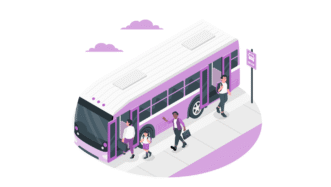LESSON OVERVIEW
This ESL lesson on getting things done and deadlines includes a range of speaking, vocabulary and grammar activities. Students talk about deadlines, learn useful vocabulary and grammar structures, watch a video and have engaging conversations.
WARM-UP & VOCABULARY
The lesson starts with a warm-up. Students look at the title of the lesson and guess what it might be about. Then, they read four opinions about deadlines and choose three collocations they would like to learn or use more often. Students also discuss these opinions, choose the one they can relate to and share their experiences. This ESL lesson on getting things done and deadlines also includes useful vocabulary. First, students read the questionnaire and match the words and phrases in bold (e.g. set out, check in on, loose ends, etc.) to their definitions. Then, students answer the questionnaire and explain their answers. There is one more activity in which students can talk about deadlines and practise the vocabulary. They complete short texts about different time management techniques and discuss their experiences using them.
VIDEO & GRAMMAR
In this part of the lesson, students watch a video and learn some grammar structures. They start by trying to predict the answers to the questions about an anti-procrastination café in Japan. Then, they watch the first part of the video and check their answers. After that, students watch the second part of the video and summarise the author’s conclusions. Students also discuss the idea of such a café and talk about productivity. Then, students move on to grammar. There are three structures that students learn and practise: have someone do something, get something done (causative), and get someone to do something. Students discuss their meanings and practise them by rewriting the sentences. This ESL lesson on getting things done and deadlines includes a creative task. Students look at the pictures and imagine what the people might be saying or thinking. They have to use the structures they’ve learnt.
HOMEWORK/REVISION
This ESL lesson on getting things done and deadlines also includes an additional task that you can use as homework or revision. It’s available in the teacher’s version of the worksheet. You can print it, cut it up and hand it out to your students. It’s also included in the e-lesson plan.
WORKSHEETS















Nice class, but keep in mind that it is definitely for more than 60 min, I did it in two classes
Thank you so much for your feedback! It might depend on how a teacher chooses to deal with exercises and whether they choose to use all of them as well. On top of that, how talkative the students are can also be a huge factor 🙂 Personally, when I teach my students using ESL Brains materials, even the same presentation works differently with different groups 🙂
What an enriching lesson! Thank you so much!
Thank you so much for your feedback! 🙂
Thanks a lot for the materials and the lesson layout!
This was a great lesson, and students enjoyed it. I wonder what others’ or your experience was in terms of using this for the first time introducing causative verbs. My students are B2 and struggled with the grammar section, so I had to break it down further with my own material in the next lesson, even making the last activity a written one for them to have more time to think through the form.
Hi Jenny!
Thank you for your feedback! We’re happy your students had fun with this lesson 🙂 When it comes to the grammar point, we intended it as revision of the topic students are familiar with at this point. For example, I’m also going to use this lesson with my students after we covered the topic of different uses of ‘get’.
Such a great and relevant topic! One question though: In the additional task, number c) – shouldn’t it say “If we don’t get it done IN time” instead of ON time, since we’re talking about a deadline? TIA!
Thank you for your feedback! We’re happy you liked the lesson 🙂
Regarding your question, we used ‘on time’ to refer to a situation in which something is completed by the agreed or expected time. Hope this helps!
Both are suitable in this context.
Both are not suitable, Each one has a very distinct meaning and are not interchangeable.
yeah whatever
In time refers to before the deadline. For example: I arrived at the airport in time to catch my flight. On time means at the exact point when something was scheduled to happen. For example: I arrived at the airport in time to catch my flight, which took off on time.
Thank you a lot for this good lesson!
My student and I love it for the interesting topic, useful set of collocations and different exerises to practise all this stuff.
Thank you for your comment! We’re happy you found the lesson useful and engaging! 🙂
As a General English teacher, IELTS instructor and and university lecturer of 26 years, I find these invaluable. Thank you kindly for your hard work and diligence. As has been stated, if I use these for actual Upper-Intermediate or Advanced lessons, I usually have to supplement them, however with the English in Central and Southeast Asia, Upper doesn’t always mean upper, so I break it down into two lessons.
Thank you so much for your kind words! We’re happy you found our materials useful! 🙂
Lovely lesson! Took us two hours of great convos and plenty of useful vocab. Thank you so much Inna!
Thank you so much for your feedback! It’s great you enjoyed the lesson and its content! 🙂